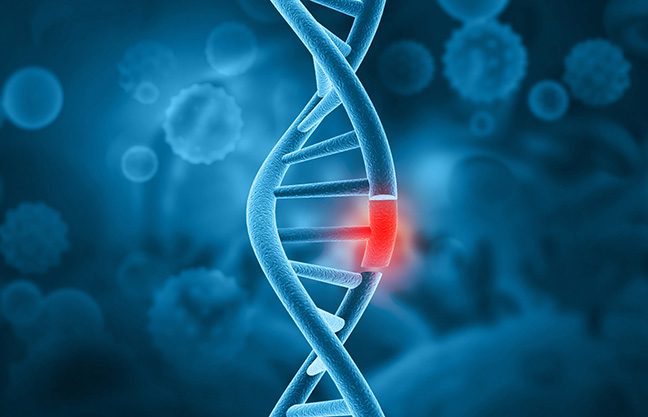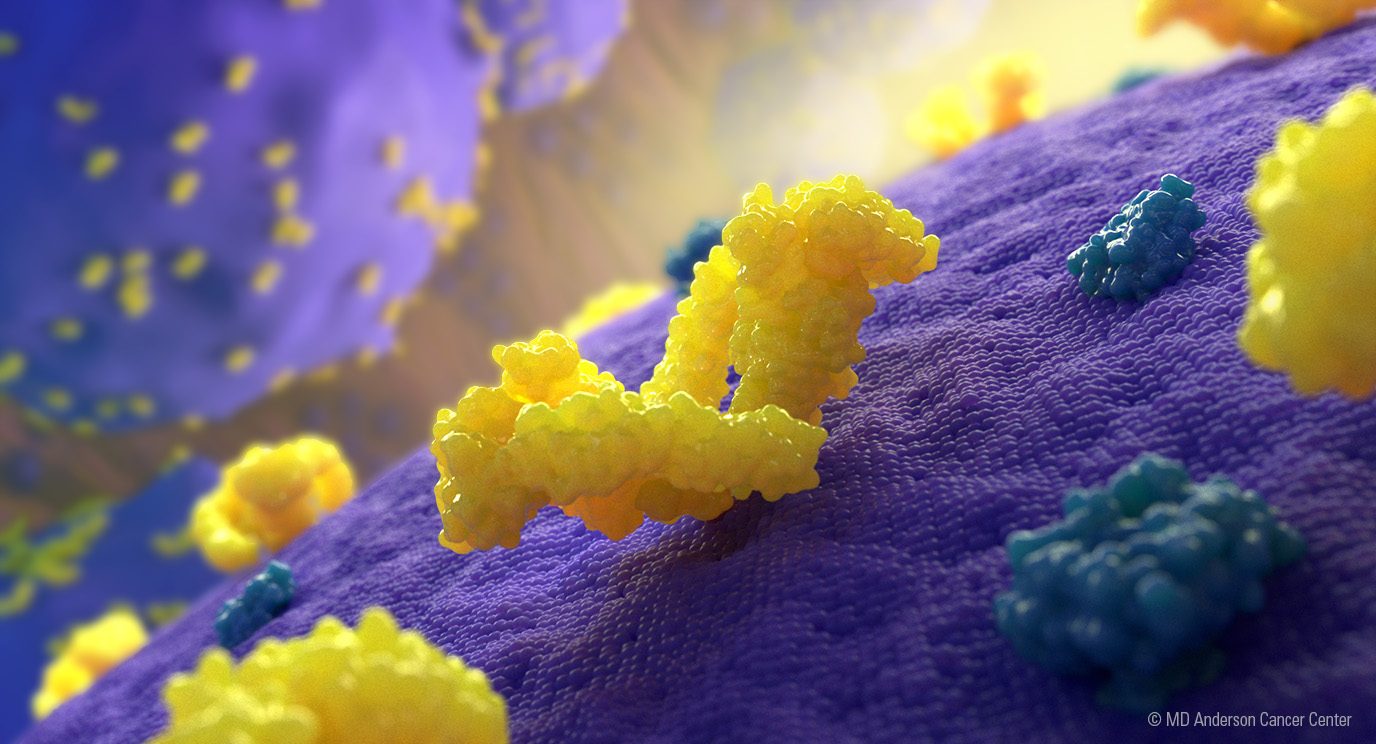- Treatment Options
- Ablation Therapy
- Angiogenesis Inhibitors
- Awake Craniotomy
- Brachytherapy
- Breast Reconstruction Surgery
- CAR T Cell Therapy
- Chemotherapy
- Cryoablation
- High-Intensity Focused Ultrasound (HIFU)
- Histotripsy
- Hyperthermic Intraperitoneal Chemotherapy
- Immunotherapy
- Immune Checkpoint Inhibitors
- Integrative Medicine
- Interventional Oncology
- Laser Interstitial Thermal Therapy (LITT)
- Microwave Ablation
- Minimally Invasive Surgery
- MR-Linac Radiation Therapy
- Palliative Care
- Proton Therapy
- Radiation Therapy
- Radiofrequency Ablation
- Stem Cell (Bone Marrow) Transplantation
- Stereotactic Body Radiation Therapy
- Stereotactic Radiosurgery
- Surgery
- Targeted Therapy
- Theranostics
- Y90 Radioembolization
Targeted Therapy (Precision Medicine)
Traditional chemotherapy works by killing cells that multiply quickly, whether normal or cancerous. Targeted therapy, a type of precision medicine, is different. It works by stopping or slowing the growth or spread of cancer.
This happens on a cellular level. Cancer cells rely on certain molecules—often proteins—to survive, grow and spread. These proteins are usually produced by cancer-causing genes or by the cancer cells themselves.
How does targeted therapy work?
Targeted therapies are designed to interfere with, or target, these molecules or the cancer-causing genes that create them. In some cases, the drug will attach to the molecule it targets, stopping it from doing its job.
In a healthy or cancerous cell, certain molecules need to be in specific locations (like on the cell surface or inside the nucleus) to do their job, for example, sending growth signals or helping the cell divide. Some targeted therapies work by stopping those molecules from reaching those locations. If the molecule can’t get to where it’s needed, it can’t carry out its role in promoting cancer growth.
There are two main types of targeted therapy drugs:
- Small molecule drugs can easily enter the cells and interfere with the molecules inside. They can also be used to interfere with molecules on the surface of the cell.
- Monoclonal antibodies are larger and work outside of cancer cells. They target molecules on the surface of the cancer cells or nearby. These are made using cloned cells that produce antibodies that interfere with the targeted molecule. Monoclonal antibodies can also be used to deliver a toxic molecule directly into a cancer cell.
What diseases does targeted therapy treat?
Targeted therapy is used to treat certain types of cancer by attacking specific genes, proteins or other factors that help cancer grow. It is commonly used for:
- Breast cancer (HER2-positive breast cancer and triple-negative breast cancer)
- Lung cancer (EGFR, ALK, or ROS1 gene mutations and others)
- Colorectal cancer (KRAS and BRAF gene mutations)
- Melanoma (BRAF mutation)
- Leukemia (Chronic myeloid leukemia, acute lymphocytic leukemia with specific gene changes)
- Lymphoma (certain types with CD markers)
- Kidney cancer
- Thyroid cancer (RET gene mutation)
- Cholangiocarcinoma and bladder cancer (FGFR1-3 gene mutation)
Who gets targeted therapy?
You may be a candidate for targeted therapy if:
- Your cancer has a specific genetic mutation or protein that can be targeted.
- Other treatments like chemotherapy or radiation aren’t effective or cause severe side effects.
- Your cancer has spread (metastasized) and needs a more personalized approach.
Doctors may perform genomic tests to look for abnormalities in tumor DNA or blood. This can determine which genes are mutated or have extra copies and if there are gene abnormalities that can be targeted.
Even if a patient has a molecule that can be targeted, in some cases, the drug stops working after a period of time. This usually occurs when the cancer finds some other way to keep growing despite the treatment. Repeating genomic testing can sometimes help determine how the tumor outsmarted the drug and guide the next steps in treatment.
What happens during a targeted therapy procedure?
Targeted therapy can be given in different ways:
- Pills or capsules: Many targeted therapies come in oral form, taken at home.
- IV infusion: Some drugs are given through a vein at a hospital or clinic.
The steps to receiving targeted therapy are:
- Testing and treatment plan: Your doctor will run genetic tests to identify if your cancer has a targetable mutation.
- Starting treatment: You’ll receive your medication as an infusion or pills, usually daily or in cycles.
- Monitoring and adjustments: Your care team will track your response and adjust your treatment if needed.
Targeted therapies may be given along with other treatments like chemotherapy, radiation or immunotherapy to improve treatment effectiveness.
Targeted therapy side effects
Although targeted therapies are designed to affect cancer cells more than normal cells, they may still have side effects. Side effects depend on the targeted therapy drug a patient is taking.
Common side effects include:
- Fatigue
- Skin rash or dry skin
- Diarrhea or nausea
- High blood pressure
- Liver problems (elevated liver enzymes)
Less common but serious side effects include:
- Heart problems
- Lung inflammation
- Blood clotting issues
Your care team will monitor you closely and provide medications or lifestyle adjustments to help manage any side effects.
Learn more about the side effects of targeted therapies.
Clinical Trials
MD Anderson patients have access to clinical trials offering promising new treatments that cannot be found anywhere else.
Dermatologist: How to deal with targeted therapy-related skin rashes
EGFR inhibitors are a class of targeted therapy used to treat several cancers, including colorectal cancer.
About 80% of patients who receive them will also develop an acne-like rash as a side effect. Sometimes, this rash can be quite severe. If not controlled adequately, it may force patients to stop taking the EGFR inhibitor entirely and explore other treatment options.
But why does this skin-related side effect even happen? Can it be prevented? And, what strategies have we developed to control it, so that patients can stay on their treatment plans?
Christine Parseghian, M.D., a medical oncologist who specializes in the treatment of gastrointestinal cancers, and I recently explored this topic on MD Anderson’s Cancerwise podcast. Here are a few highlights of what we shared.
Why EGFR inhibitors can cause an acne-like rash
EGFR stands for epidermal growth factor receptor. The epidermis is the top layer of skin. So, the same growth receptors that EGFR inhibitors target on the surface of some tumor cells are also present in the skin. That’s why there’s such a high incidence of this side effect with this particular therapy.
An EGFR-inhibitor-related rash is called “acneiform” because it resembles the same kind of acne some teenagers develop, with deep cysts and inflamed papules and pustules. The mechanism that causes it is different, of course, but you still tend to see it in the same places, including the head and neck, chest and upper back. It can be pretty itchy and painful for patients with deeper or cystic lesions.
Featured Articles

What are PARP inhibitors?

Stage IV lung cancer survivor: Targeted therapy and surgery left me cancer-free

RET inhibitors: A treatment for any RET-altered cancer

How are biomarkers used to treat cancer?

Targeting the KRAS mutation for more effective cancer treatment

Thanks to targeted therapy, lung cancer survivor is enjoying life again

How does targeted therapy treat cancer?

Uterine cancer survivor lives life to the fullest after targeted therapy
request an appointment online.
Help #EndCancer
Give Now
Donate Blood
Our patients depend on blood and platelet donations.
Shop MD Anderson
Show your support for our mission through branded merchandise.

